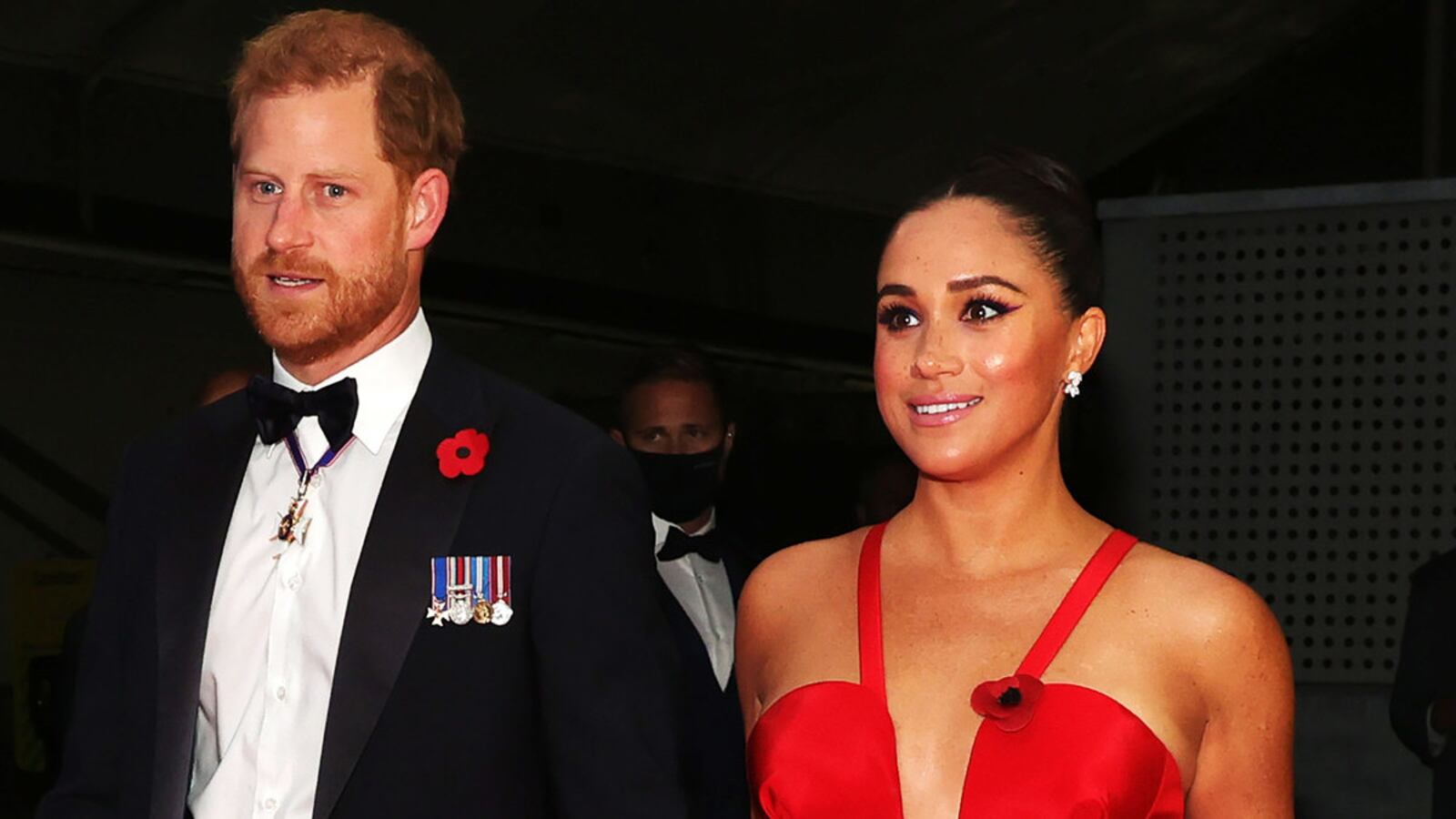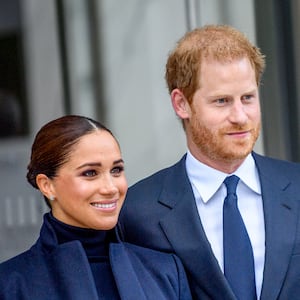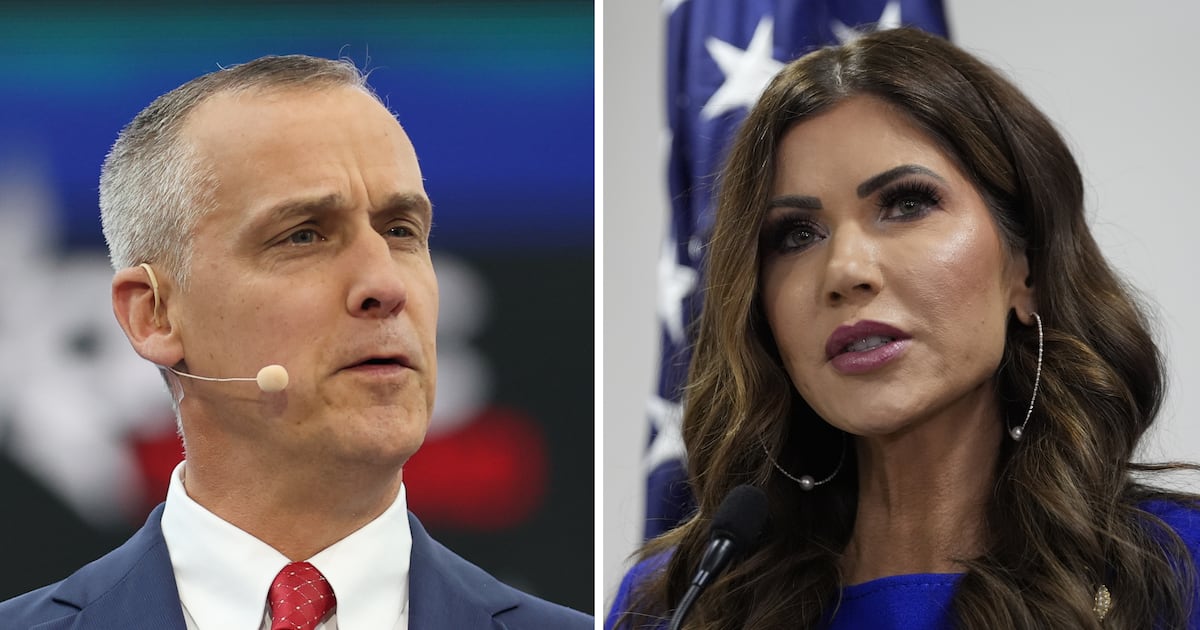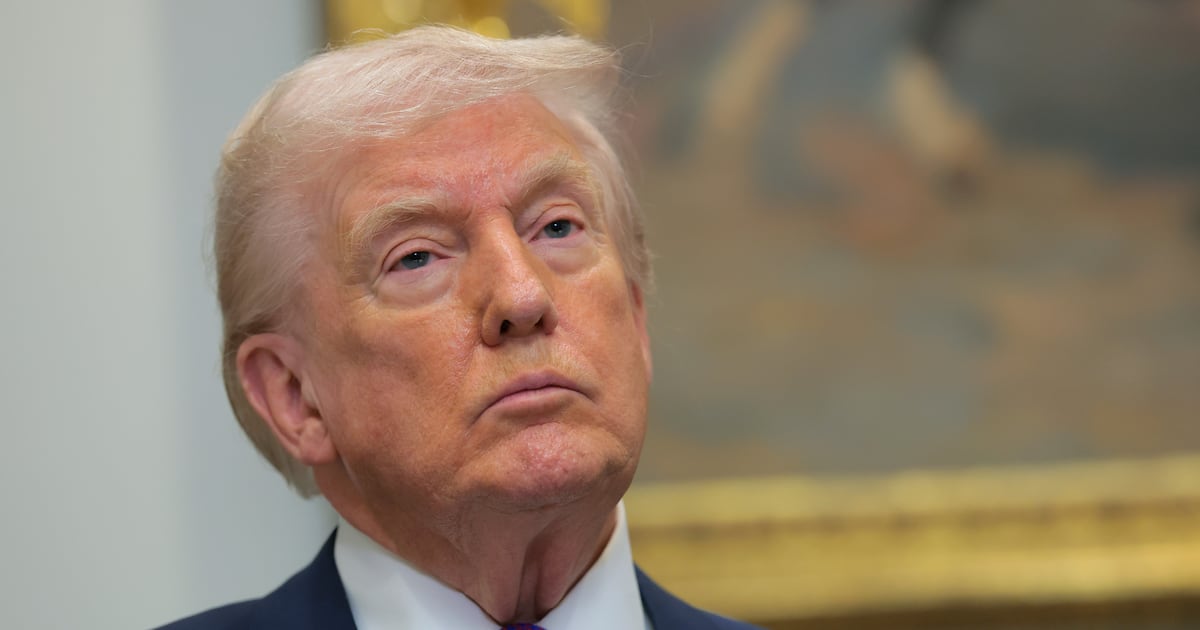Wednesday night saw Prince Harry and Meghan Markle in full glamor mode.
Arriving at a veterans’ gala in New York, she sparkled in a bespoke red Carolina Herrera gown and tens of thousands of dollars worth of gems, including Princess Diana’s diamond tennis bracelet from Cartier, according to a report in the Daily Mail.
Meghan was perfectly complemented by Harry, who looked every inch the glamorous prince, wearing black tie, with his Knight Commander of the Royal Victorian Order medal slung boldly around his neck.
The pair were the stars of the show, delivering high octane glamor and, on Harry’s part, a moving speech. It was a very glamorous, very American, homage to the veteran community.
The same could not be said of an announcement at 11 a.m. the next day in a London courtroom, when the plummy English voices of Britain’s legal elite were silenced by the rougher accents of the “security controller” who, over the public address system, invited all present to observe two minutes silence to mark the anniversary of the armistice—11:00 on 11/11/1918—which brought to an end World War I.
As the lawyers shuffled to their feet in the untidy courtroom and hung their heads respectfully, there could hardly have been a better illustration of the life of dull, grey British duty that Harry and Meghan traded in for the glamor of supercharged American celebrity.
Unfortunately for Harry and Meghan, however, the tooth-grindingly tedious and meticulous world of the British legal system may not be ready to let them go quite as easily as Buckingham Palace did.
Meghan Markle’s admission to a London court this week that she had “forgotten” about a detailed email she wrote for her chief press officer, Jason Knauf, to use when briefing the authors of the book Finding Freedom, opens up for the couple the distinctly unappealing prospect that Meghan’s privacy action against the publishers of the Mail titles, Associated Newspapers, could be heading back to court.

Meghan, Duchess of Sussex and Prince Harry, Duke of Sussex make an official visit to the Joff Youth Centre in Peacehaven, Sussex on October 3, 2018 in Peacehaven, United Kingdom.
Chris Jackson/Getty ImagesOn Thursday it was revealed in court how and why Knauf turned on his former boss and published Meghan’s emails and texts in a witness statement.
Knauf, it was claimed by Associated Newspapers Limited (ANL), reached out via a source to ANL, letting them know he “regretted” not giving evidence earlier. This ultimately resulted in him providing the explosive statement released yesterday.
It appears that Knauf changed his position from neutrality to actively disputing Meghan’s version of events in July of this year, after Harry and Meghan’s interview with Oprah, and after details of his internal complaint that Meghan bullied members of her staff were leaked to The Times of London, allegations that were rubbished as untrue smears by the Sussexes.
In that story, The Times’ royal correspondent Valentine Low said the information was provided to him by sources who “approached The Times because they felt that only a partial version had emerged of Meghan’s two years as a working member of the royal family and they wished to tell their side, concerned about how such matters are handled by the palace.”
This ultimate insider’s decision to turn on his former masters having been “deprived” of the opportunity to give oral evidence at a trial by the summary judgement, as ANL’s solicitor put it, bodes ill for Meghan and Harry.
Fascinatingly, for students of internecine royal feuding, Knauf still works for Prince William and Kate as chief executive of their foundation but has announced his intention to leave at the end of the year. Relations with the Cambridges are rumored to be good, and they are thought to be sad to see him go. He is reported to be leaving because his husband has been offered a job overseas.
Knauf’s evidence could be crucial. As David Hooper, the retired star libel lawyer and author of Reputations Under Fire, told The Daily Beast: “It looks as if she has very seriously misled the court. I think there is a real prospect that the court will now allow what the Mail are asking for, which is that there should be a full trial of the case.”
Such an outcome, in which Harry and Meghan would likely be called for brutal cross-examination as witnesses, would be a major setback for the couple, who might have been forgiven for thinking they had put the affair behind them.
Earlier this year, after all, judge Mark Warby declared that there was so little prospect of Associated Newspapers winning the case that he stopped the trial and handed Meghan a “summary judgement” in her favor. The Mail had invaded her privacy and breached her copyright by publishing what was clearly a private and personal letter to her father, he said, and that was that.

Prince Harry, Duke of Sussex (L) and Meghan, Duchess of Sussex arrive to attend the annual Commonwealth Day Service at Westminster Abbey on March 9, 2020 in London, England.
Dan Kitwood/Getty ImagesOne expert in the intersection of law and royalty, Mark Stephens, of law firm Howard Kennedy, told The Daily Beast: “Warby’s summary judgment has been the subject of some academic discussion in the legal world. Some lawyers felt he went too early.
“Warby said there was no evidence that could mean this was not a breach of privacy. So, no trial. But ANL have now brought evidence that she thought the letter would leak or even intended it to be leaked, and crafted it in anticipation of such an eventuality. They say that this means that she should have had a lower expectation of privacy around the publication of the letter. As a consequence of that, they say, there is at least an issue which deserves to be fully tried.”
The evidence that Stephens is referring to is, of course, the bombshell statement from Knauf, Meghan’s former chief press officer, in which he reproduced multiple messages from Meghan to Knauf, including one in which she said she would address her father as “Daddy” in her letter so it would “pull at the heartstrings” if he leaked it.
Knauf also said “the duke and duchess authorized specific co-operation in writing” with Omid Scobie and Carolyn Durand, directly contradicting Meghan’s earlier claim in court papers she did not do that.
Despite the fact that the case is about the letter Meghan wrote to her dad, not the sourcing for the book, this statement from Knauf changes everything, Hooper says: “Until this evidence came out it was probably quite unlikely that the Court of Appeal would have reversed the decision of Warby. He is the most experienced media judge. But it looks as if Meghan pulled the wool over his eyes, and this an entirely different ball game now.
“This isn’t some minor detail, this is absolutely at the heart of it; the whole issue of whether she authorized this biography was a very important part of the case. There is a danger the court may think she has been telling whoppers.”
Stephens concurs. “It is about credibility. It says: ‘How reliable is this person?’ It may well weigh in ANL’s favor for pushing in terms of further disclosure and asking for the matter to be tried.”
The timing of the revelation was deeply inconvenient, both for Meghan and her husband, given that just hours earlier they had been publicly roasting the press at online think-ins.
On Tuesday afternoon, Meghan appeared as a feted guest at the starry DealBook summit. She criticized tabloid magazines, saying they should come with a warning sign on them like cigarettes, alerting consumers they were deleterious to mental health.
Prince Harry, meanwhile, appearing on a panel discussion for Wired magazine on the same day, criticized the press in even stronger terms, saying that “the incentives of publishing are not necessarily aligned with the incentives of truth,” and blaming the “self-manufactured rabidness” of the media for the death of his mother. He even, to the evident consternation of the chair, urged “honest” journalists “to expose the unethical, the immoral and dishonest amongst them.”
Bad luck, then, for these noted campaigners for honesty in the press that just a few hours later it was revealed that they had not been entirely honest themselves when they claimed, repeatedly, both to the media and in court statements, that they had never co-operated with the authors of the book Finding Freedom.
In fact, as Knauf revealed, Meghan had assisted rather extensively with a briefing he had given to the authors of the book, Omid Scobie and Carolyn Durand.

Queen Elizabeth II, Prince Harry, Duke of Sussex and Meghan, Duchess of Sussex on the balcony of Buckingham Palace as the Royal family attend events to mark the Centenary of the RAF on July 10, 2018 in London, England.
Chris Jackson/Getty ImagesIn December 2018, for example, she sent Knauf a lengthy email responding to a series of questions the writers had submitted.
These emails were published in court yesterday and clearly show Meghan attempting to cast herself in a positive light.
For example, one of the topics suggested by the authors was “tabloid stories that need correcting/batting down: tiara, etc.”
Meghan, in reply, speaking about herself in the third person wrote: “Meghan shared the very special story about choosing the tiara in their wedding exhibition now ongoing at Windsor. The queen, Harry and Meghan were all present—she tried on five tiaras and the queen asked her which she preferred. Meghan asked the queen her preference. The queen said they all suited her and Meghan chose the diamond one, which the queen agreed was perfect.
“Shame to see such a beautiful sweet moment skewed in media. There was no conversation about any other tiara as a preference. Meghan loved the one she wore and it remains a very special memory.”
This vignette made it into the final version of Finding Freedom in the following form: “With the queen and Prince Harry looking on, Angela presented five different tiaras for Meghan to consider…each tiara was carefully placed upon her head until a decision was made…the queen agreed with Meghan upon her choice of tiara for the wedding…‘It was a special moment for both of them,’ a palace aide shared.”
In other parts of the email Meghan disavowed her half siblings, criticized her father and told Knauf to tell the journalists she had been harassed by paparazzi. These details also made the book. She also told Knauf to come back to her if he needed to “fill in any other blanks.”
She had, she told the court, “forgotten” this email, one of several dealing with the book exchanged between her, Knauf and Harry, and apologized to the court for that.
Legal sources said that Meghan’s error would not rise to the level of perjury but the reaction, in the U.K. at least, has been one of general derision. British tabloid the Sun had a typically scathing response to Meghan’s “oops” defense in its Thursday edition: a mock-up of Meghan as the beloved children’s character “Little Miss Forgetful.”
The odd thing about this whole drama, to seasoned royal reporters, is that the authors of books about the royals (and indeed many royal journalists) are often granted a background chat with a palace press office source to provide “context.”
Talking to the author of a book about you is often a good idea, and none of this would matter, legally speaking, were it not for the fact that Meghan denied in court papers that she had ever co-operated with Scobie and Durand.
The admission by Meghan that she did brief them, albeit indirectly via Knauf, may or may not convince the judge of ANL’s argument that Meghan might thereby have forfeited her right to privacy over the letter written to her father, and that ANL therefore deserves to have its day in court.
Meghan’s spokesperson declined to comment but asked The Daily Beast to consider their lawyer’s oral argument in court.
Their lawyer said, in part: “We say the entire case about her cooperation with the authors simply falls flat…[Meghan] is quite openly, as far as Mr Knauf is concerned, allowing him as part of the job he’s paid to do, which is to deal with media enquiries, she is happy to provide him with some background information for his meeting with the authors. But it doesn’t include the letter. She had every opportunity. This was the perfect opportunity if she wanted to get it into the public domain.”
Omid Scobie and Carolyn Durand did not reply to requests for comment.
Regardless of where this ultimately lands, the optics of today are appalling for the Sussexes; it makes Meghan (and Harry, who is being inexorably sucked into the maelstrom) look, at best, calculating, at worst, deeply hypocritical.
As the writer Penny Junor, herself a royal biographer, quipped to The Daily Beast about their collaboration with Scobie and Durand: “It is very odd that they denied it—and even odder to forget about it.”
Of course, what happens next depends largely on whether or not ANL succeed in getting the judge to agree to send the case back to court for a trial.
This decision will likely not be handed down for several days or even weeks—there is no set timetable.
But if it does go back to court, a dizzying array of possibilities present themselves, most of which represent a huge headache for Meghan and Harry.
It seems likely, for example, that ANL will wish to investigate whether or not there was any further collaboration with Scobie and Durand.
Knauf said he had no knowledge of whether there was or not, stating: “I am not aware whether the cooperation with the authors continued after I ceased working for the couple in March 2019…As far as I am aware the Duke and Duchess of Sussex did not meet the authors to discuss the book during my time as the couple’s communications secretary. I advised them not to engage directly with the authors about the book. I am not aware of what happened after March 2019.”
Another avenue to explore will, of course, be whether any of Meghan’s friends were given permission to speak to Scobie and Durand. It also seems inevitable that ANL will want to test the evidence of the so-called “five friends,” the individuals who gave interviews to People magazine in which one of them mentioned the letter in the first place, provoking Thomas Markle to release his copy of it.
Although these five friends have been speculatively identified by the media, officially their identity remains protected by the court. They all submitted witness statements to the first trial, which were seen by the judge but are not public—for now.
Meghan has always insisted that they spoke to the magazine on their own initiative, without her permission, blessing or foreknowledge. Given that Meghan won her summary judgement, it seems reasonable to conclude that their statements back up her version of events. But if one of them were to do a Knauf, so to speak, to break ranks or change their story—then that could be a truly disastrous turn of events for Meghan.







